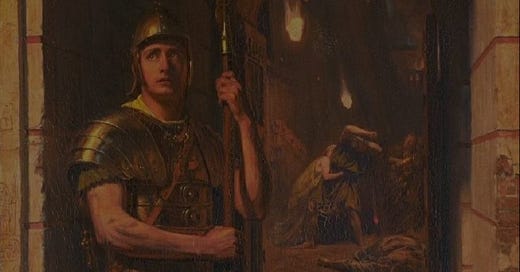The Central Truth Of Lord Of The Rings
Spengler's lines are beautiful but horrifying. Lurking behind them one finds a grotesque superimposition of an exquisite virtue - noble steadfastness in the face of death - and the madness of an ignoble vice - nihilistic despair. Is there not an echo in Spengler’s centurion of Denethor, Tolkien’s Steward of Gondor, who, perceiving the irresistible strength of his foe and the end of the age of men, resolves to share the flames of death with his mortally wounded son? The Denethor of the books is not crass and squalid, as he was elsewhere portrayed. Tolkien writes him as a character of rare nobility and refinement, to the end. "He is not as other men of this time… by some chance the blood of Westernesse runs nearly true in him..."
"He has long sight. He can perceive, if he bends his will thither, much of what is passing in the minds of men, even of those that dwell far off." Denethor’s flaw, his central sin, that led to his eventual madness and suicidal fury was a lack of hope, given all he had forseen.
Again, the parallels to Spengler - a man of tremendous vision and yet of catastrophic pessimism - are clear. "Every creation succumbs to decay; every thought, every discovery, every deed to oblivion." These qualities of Spengler - vision and pessimism - are inextricably bound. Spengler’s masterwork, his total theory of history, reveals to him that there is no salvation to be found in it. The past echoes into the future, and he knows what is to come: decline and fall.
Surprisingly, perhaps, this understanding was shared by Tolkien, who meditated both in his work and in his life on his conviction: “I do not expect 'history' to be anything but a 'long defeat'..."
There are deep parallels between Tolkien’s world-building, in which ‘the decline and fall of Middle Earth’ is a perpetual and inescapable force, and Spengler’s magnum opus, Der Untergang des Abendlandes - The Fall of the West.
By the time of the events of The Lord of The Rings, the era of the greatest of men and Eldar is past. “The Blood of Numenor is all but spent, its pride and dignity forgotten.” But in the face of this irresistible force, Tolkien’s greatest heroes (and indeed Spengler himself) demonstrate a virtue that underpins the author’s central philosophy: the quality that he called ‘Northern Courage’. Tolkien perceived in the great cultures of Northern Europe an unshakeable commitment to fight, and to fight well, to the bitter end - even when defeat was certain. For him, this was exemplified by the gods of Norse mythology, who knew they would die in the final battle, Ragnarök, but nonetheless they went to fight, despite the prophecy that sun would become black, the earth would sink into the sea, and flames would touch the heavens.
But Tolkien was not a pagan, and for him this brilliant, beautiful idea was incomplete. He believed in a path to adopt this virtue without falling into madness and despair. To complete our earlier quotation: "Actually, I am a Christian, and indeed a Roman Catholic, so that I do not expect 'history' to be anything but a 'long defeat' - though it contains (and in a legend may contain more clearly and movingly) some samples or glimpses of final victory."
This world is fallen, and there is no salvation within it. Spengler’s diagnosis is correct: an apocalypse must come.
But his failure is that his vision is limited to those powers within this world; not those that made it, that underpin it, and that will continue after it has fallen. Spengler was a man of immense will, embodying a profound but incomplete Northern Courage. Tolkien recognized this limitation. His great project was to tether this virtue to the transcendent: to bring Northern Courage to its completion, to give meaning to the ultimate sacrifice by endowing it with consequence, by revealing that our creator bears witness to our heroism.
Northern Courage is brought to its completion with the concept of ‘estel’: a naive but profound hope found in the hearts of Tolkien’s heroes. Estel is a trust that “is not defeated by the ways of the world, for it does not come from experience, but from our nature and first being." It is a reflection of the Christian belief that the Cross has been present “from before the foundation of the world."
It is this hope that completes Northern Courage. Its presence divides Denethor, Steward of Gondor, and his holy reflection, Theoden, King of Rohan. Theoden embraces death not with despair, but with joy. He does not accept death, he desires it, longs for it: its call sings in his blood, and his final redemption comes as he answers that call. Theoden extols death in his final cry to the Rohirrim before he charges the Pelennor Fields, going to his doom and salvation: "Forth, and fear not darkness. Arise! Arise, riders of Theoden! Spears shall be shaken! Shields shall be splintered! A sword day. A red day. ‘Ere the sun rises! Ride now! Ride now! Ride! Ride for ruin, and the world ending! Death! Death! Death!"



